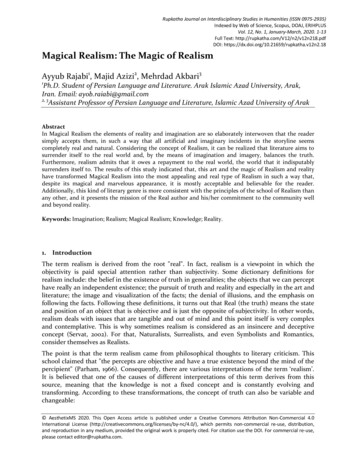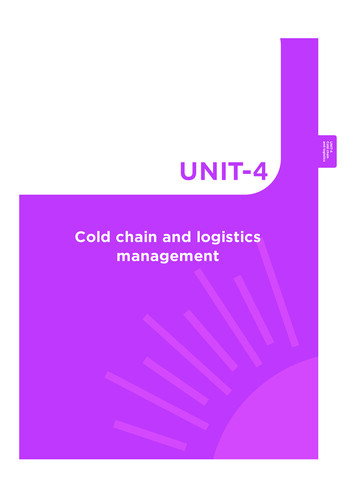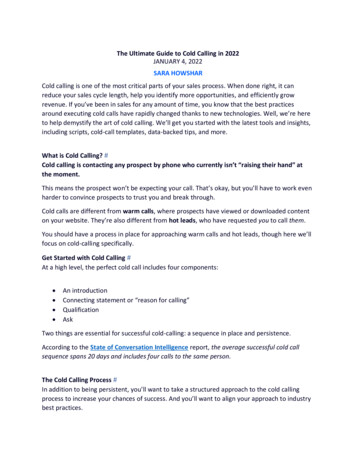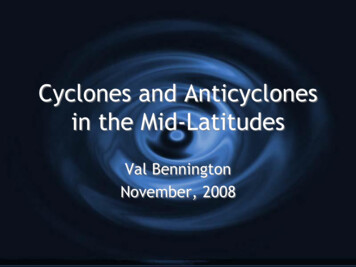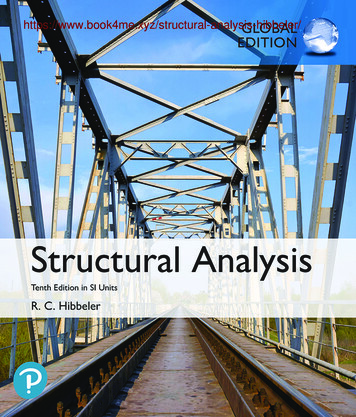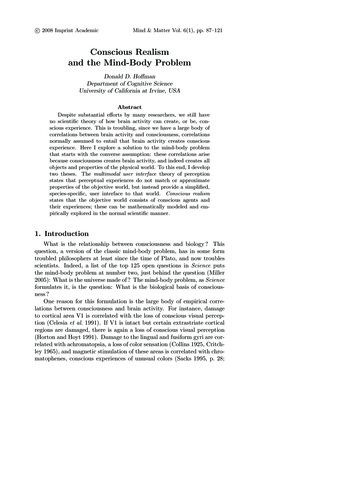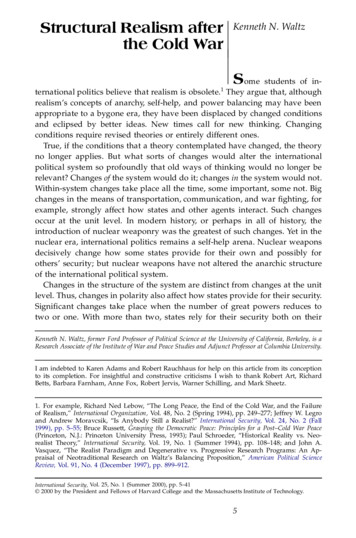
Transcription
Structural Realism afterthe Cold WarKenneth N. WaltzSome students of international politics believe that realism is obsolete.1 They argue that, althoughrealism’s concepts of anarchy, self-help, and power balancing may have beenappropriate to a bygone era, they have been displaced by changed conditionsand eclipsed by better ideas. New times call for new thinking. Changingconditions require revised theories or entirely different ones.True, if the conditions that a theory contemplated have changed, the theoryno longer applies. But what sorts of changes would alter the internationalpolitical system so profoundly that old ways of thinking would no longer berelevant? Changes of the system would do it; changes in the system would not.Within-system changes take place all the time, some important, some not. Bigchanges in the means of transportation, communication, and war ghting, forexample, strongly affect how states and other agents interact. Such changesoccur at the unit level. In modern history, or perhaps in all of history, theintroduction of nuclear weaponry was the greatest of such changes. Yet in thenuclear era, international politics remains a self-help arena. Nuclear weaponsdecisively change how some states provide for their own and possibly forothers’ security; but nuclear weapons have not altered the anarchic structureof the international political system.Changes in the structure of the system are distinct from changes at the unitlevel. Thus, changes in polarity also affect how states provide for their security.Signi cant changes take place when the number of great powers reduces totwo or one. With more than two, states rely for their security both on theirKenneth N. Waltz, former Ford Professor of Political Science at the University of California, Berkeley, is aResearch Associate of the Institute of War and Peace Studies and Adjunct Professor at Columbia University.I am indebted to Karen Adams and Robert Rauchhaus for help on this article from its conceptionto its completion. For insightful and constructive criticisms I wish to thank Robert Art, RichardBetts, Barbara Farnham, Anne Fox, Robert Jervis, Warner Schilling, and Mark Sheetz.1. For example, Richard Ned Lebow, “The Long Peace, the End of the Cold War, and the Failureof Realism,” International Organization, Vol. 48, No. 2 (Spring 1994), pp. 249–277; Jeffrey W. Legroand Andrew Moravcsik, “Is Anybody Still a Realist?” International Security, Vol. 24, No. 2 (Fall1999), pp. 5–55; Bruce Russett, Grasping the Democratic Peace: Principles for a Post–Cold War Peace(Princeton, N.J.: Princeton University Press, 1993); Paul Schroeder, “Historical Reality vs. Neorealist Theory,” International Security, Vol. 19, No. 1 (Summer 1994), pp. 108–148; and John A.Vasquez, “The Realist Paradigm and Degenerative vs. Progressive Research Programs: An Appraisal of Neotraditional Research on Waltz’s Balancing Proposition,” American Political ScienceReview, Vol. 91, No. 4 (December 1997), pp. 899–912.International Security, Vol. 25, No. 1 (Summer 2000), pp. 5–41 2000 by the President and Fellows of Harvard College and the Massachusetts Institute of Technology.5
International Security 25:1 6own internal efforts and on alliances they may make with others. Competitionin multipolar systems is more complicated than competition in bipolar onesbecause uncertainties about the comparative capabilities of states multiply asnumbers grow, and because estimates of the cohesiveness and strength ofcoalitions are hard to make.Both changes of weaponry and changes of polarity were big ones withrami cations that spread through the system, yet they did not transformit. If the system were transformed, international politics would no longer beinternational politics, and the past would no longer serve as a guide to thefuture. We would begin to call international politics by another name, assome do. The terms “world politics” or “global politics,” for example, suggestthat politics among self-interested states concerned with their securityhas been replaced by some other kind of politics or perhaps by no politics atall.What changes, one may wonder, would turn international politics into something distinctly different? The answer commonly given is that internationalpolitics is being transformed and realism is being rendered obsolete as democracy extends its sway, as interdependence tightens its grip, and as institutionssmooth the way to peace. I consider these points in successive sections. Afourth section explains why realist theory retains its explanatory power afterthe Cold War.Democracy and PeaceThe end of the Cold War coincided with what many took to be a new democratic wave. The trend toward democracy combined with Michael Doyle’srediscovery of the peaceful behavior of liberal democratic states inter se contributes strongly to the belief that war is obsolescent, if not obsolete, amongthe advanced industrial states of the world.2The democratic peace thesis holds that democracies do not ght democracies. Notice that I say “thesis,” not “theory.” The belief that democraciesconstitute a zone of peace rests on a perceived high correlation betweengovernmental form and international outcome. Francis Fukuyama thinks thatthe correlation is perfect: Never once has a democracy fought another democracy. Jack Levy says that it is “the closest thing we have to an empirical law2. Michael W. Doyle, “Kant, Liberal Legacies, and Foreign Affairs, Parts 1 and 2,” Philosophy andPublic Affairs, Vol. 12, Nos. 3 and 4 (Summer and Fall 1983); and Doyle, “Kant: Liberalism andWorld Politics,” American Political Science Review, Vol. 80, No. 4 (December 1986), pp. 1151–1169.
Structural Realism after the Cold War 7in the study of international relations.”3 But, if it is true that democracies restreliably at peace among themselves, we have not a theory but a purported factbegging for an explanation, as facts do. The explanation given generally runsthis way: Democracies of the right kind (i.e., liberal ones) are peaceful inrelation to one another. This was Immanuel Kant’s point. The term he usedwas Rechtsstaat or republic, and his de nition of a republic was so restrictivethat it was hard to believe that even one of them could come into existence,let alone two or more.4 And if they did, who can say that they would continueto be of the right sort or continue to be democracies at all? The short and sadlife of the Weimar Republic is a reminder. And how does one de ne what theright sort of democracy is? Some American scholars thought that WilhelmineGermany was the very model of a modern democratic state with a widesuffrage, honest elections, a legislature that controlled the purse, competitiveparties, a free press, and a highly competent bureaucracy.5 But in the French,British, and American view after August of 1914, Germany turned out not tobe a democracy of the right kind. John Owen tried to nesse the problem ofde nition by arguing that democracies that perceive one another to be liberaldemocracies will not ght.6 That rather gives the game away. Liberal democracies have at times prepared for wars against other liberal democracies andhave sometimes come close to ghting them. Christopher Layne shows thatsome wars between democracies were averted not because of the reluctance ofdemocracies to ght each other but for fear of a third party—a good realistreason. How, for example, could Britain and France ght each other overFashoda in 1898 when Germany lurked in the background? In emphasizingthe international political reasons for democracies not ghting each other,Layne gets to the heart of the matter.7 Conformity of countries to a prescribed3. Francis Fukuyama, “Liberal Democracy as a Global Phenomenon,” Political Science and Politics,Vol. 24, No. 4 (1991), p. 662. Jack S. Levy, “Domestic Politics and War,” in Robert I. Rotberg andTheodore K. Rabb, eds., The Origin and Prevention of Major Wars (Cambridge: Cambridge UniversityPress, 1989), p. 88.4. Kenneth N. Waltz, “Kant, Liberalism, and War,” American Political Science Review, Vol. 56, No. 2(June 1962). Subsequent Kant references are found in this work.5. Ido Oren, “The Subjectivity of the ‘Democratic’ Peace: Changing U.S. Perceptions of ImperialGermany,” International Security, Vol. 20, No. 2 (Fall 1995), pp. 157ff.; Christopher Layne, in thesecond half of Layne and Sean M. Lynn-Jones, Should America Spread Democracy? A Debate (Cambridge, Mass.: MIT Press, forthcoming), argues convincingly that Germany’s democratic control offoreign and military policy was no weaker than France’s or Britain’s.6. John M. Owen, “How Liberalism Produces Democratic Peace,” International Security, Vol. 19,No. 2 (Fall 1994), pp. 87–125. Cf. his Liberal Peace, Liberal War: American Politics and InternationalSecurity (Ithaca, N.Y.: Cornell University Press, 1997).7. Christopher Layne, “Kant or Cant: The Myth of the Democratic Peace,” International Security,Vol. 19, No. 2 (Fall 1994), pp. 5–49.
International Security 25:1 8political form may eliminate some of the causes of war; it cannot eliminate allof them. The democratic peace thesis will hold only if all of the causes of warlie inside of states.the causes of warTo explain war is easier than to understand the conditions of peace. If one askswhat may cause war, the simple answer is ”anything.“ That is Kant’s answer:The natural state is the state of war. Under the conditions of internationalpolitics, war recurs; the sure way to abolish war, then, is to abolish international politics.Over the centuries, liberals have shown a strong desire to get the politics outof politics. The ideal of nineteenth-century liberals was the police state, that is,the state that would con ne its activities to catching criminals and enforcingcontracts. The ideal of the laissez-faire state nds many counterparts amongstudents of international politics with their yen to get the power out of powerpolitics, the national out of international politics, the dependence out of interdependence, the relative out of relative gains, the politics out of internationalpolitics, and the structure out of structural theory.Proponents of the democratic peace thesis write as though the spread ofdemocracy will negate the effects of anarchy. No causes of con ict and warwill any longer be found at the structural level. Francis Fukuyama nds it”perfectly possible to imagine anarchic state systems that are nonethelesspeaceful.“ He sees no reason to associate anarchy with war. Bruce Russettbelieves that, with enough democracies in the world, it “may be possible inpart to supersede the ‘realist’ principles (anarchy, the security dilemma ofstates) that have dominated practice . . . since at least the seventeenth century.”8 Thus the structure is removed from structural theory. Democratic stateswould be so con dent of the peace-preserving effects of democracy that theywould no longer fear that another state, so long as it remained democratic,would do it wrong. The guarantee of the state’s proper external behaviorwould derive from its admirable internal qualities.This is a conclusion that Kant would not sustain. German historians at theturn of the nineteenth century wondered whether peacefully inclined statescould be planted and expected to grow where dangers from outside presseddaily upon them.9 Kant a century earlier entertained the same worry. The8. Francis Fukuyama, The End of History and the Last Man (New York: Free Press, 1992), pp. 254–256.Russett, Grasping the Democratic Peace, p. 24.9. For example, Leopold von Ranke, Gerhard Ritter, and Otto Hintze. The American WilliamGraham Sumner and many others shared their doubts.
Structural Realism after the Cold War 9seventh proposition of his ”Principles of the Political Order“ avers that establishment of the proper constitution internally requires the proper ordering ofthe external relations of states. The rst duty of the state is to defend itself,and outside of a juridical order none but the state itself can de ne the actionsrequired. ”Lesion of a less powerful country,“ Kant writes, ”may be involvedmerely in the condition of a more powerful neighbor prior to any action at all;and in the State of Nature an attack under such circumstances would bewarrantable.“ 10 In the state of nature, there is no such thing as an unjust war.Every student of international politics is aware of the statistical data supporting the democratic peace thesis. Everyone has also known at least sinceDavid Hume that we have no reason to believe that the association of eventsprovides a basis for inferring the presence of a causal relation. John Muellerproperly speculates that it is not democracy that causes peace but that otherconditions cause both democracy and peace.11 Some of the major democracies—Britain in the nineteenth century and the United States in the twentiethcentury—have been among the most powerful states of their eras. Powerfulstates often gain their ends by peaceful means where weaker states either failor have to resort to war.12 Thus, the American government deemed the democratically elected Juan Bosch of the Dominican Republic too weak to bringorder to his country. The United States toppled his government by sending23,000 troops within a week, troops whose mere presence made ghting a warunnecessary. Salvador Allende, democratically elected ruler of Chile, was systematically and effectively undermined by the United States, without the openuse of force, because its leaders thought that his government was taking awrong turn. As Henry Kissinger put it: ”I don’t see why we need to stand byand watch a country go Communist due to the irresponsibility of its ownpeople.“ 13 That is the way it is with democracies—their people may show badjudgment. ”Wayward“ democracies are especially tempting objects of intervention by other democracies that wish to save them. American policy may havebeen wise in both cases, but its actions surely cast doubt on the democraticpeace thesis. So do the instances when a democracy did ght another democ10. Immanuel Kant, The Philosophy of Law, trans. W. Hastie (Edinburgh: T. and T. Clark, 1887),p. 218.11. John Mueller, “Is War Still Becoming Obsolete?” paper presented at the annual meeting of theAmerican Political Science Association, Washington, D.C., August–September 1991, pp. 55ff; cf. hisQuiet Cataclysm: Re ections on the Recent Transformation of World Politics (New York: HarperCollins,1995).12. Edward Hallett Carr, Twenty Years’ Crisis: An Introduction to the Study of International Relations,2d ed. (New York: Harper and Row, 1946), pp. 129–132.13. Quoted in Anthony Lewis, “The Kissinger Doctrine,” New York Times, February 27, 1975, p. 35;and see Henry Kissinger, The White House Years (Boston: Little, Brown, 1979), chap. 17.
International Security 25:1 10racy.14 So do the instances in which democratically elected legislatures haveclamored for war, as has happened for example in Pakistan and Jordan.One can of course say, yes, but the Dominican Republic and Chile were notliberal democracies nor perceived as such by the United States. Once onebegins to go down that road, there is no place to stop. The problem is heightened because liberal democracies, as they prepare for a war they may fear,begin to look less liberal and will look less liberal still if they begin to ghtone. I am tempted to say that the democratic peace thesis in the form in whichits proponents cast it is irrefutable. A liberal democracy at war with anothercountry is unlikely to call it a liberal democracy.Democracies may live at peace with democracies, but even if all statesbecame democratic, the structure of international politics would remain anarchic. The structure of international politics is not transformed by changesinternal to states, however widespread the changes may be. In the absence ofan external authority, a state cannot be sure that today’s friend will not betomorrow’s enemy. Indeed, democracies have at times behaved as thoughtoday’s democracy is today’s enemy and a present threat to them. In FederalistPaper number six, Alexander Hamilton asked whether the thirteen states ofthe Confederacy might live peacefully with one another as freely constitutedrepublics. He answered that there have been ”almost as many popular as royalwars.“ He cited the many wars fought by republican Sparta, Athens, Rome,Carthage, Venice, Holland, and Britain. John Quincy Adams, in response toJames Monroe’s contrary claim, averred ”that the government of a Republicwas as capable of intriguing with the leaders of a free people as neighboring monarchs.“15 In the latter half of the nineteenth century, as the UnitedStates and Britain became more democratic, bitterness grew between them,and the possibility of war was at times seriously entertained on both sidesof the Atlantic. France and Britain were among the principal adversaries inthe great power politics of the nineteenth century, as they were earlier.Their becoming democracies did not change their behavior toward eachother. In 1914, democratic England and France fought democratic Germany,and doubts about the latter’s democratic standing merely illustrate the problem of de nition. Indeed, the democratic pluralism of Germany was an underlying cause of the war. In response to domestic interests, Germany followed14. See, for example, Kenneth N. Waltz, “America as Model for the World? A Foreign PolicyPerspective,” PS: Political Science and Politics, Vol. 24, No. 4 (December 1991); and Mueller, “Is WarStill Becoming Obsolete?” p. 5.15. Quoted in Walter A. McDougall, Promised Land, Crusader State (Boston: Houghton Mif in,1997), p. 28 and n. 36.
Structural Realism after the Cold War 11policies bound to frighten both Britain and Russia. And today if a war that afew have feared were fought by the United States and Japan, many Americanswould say that Japan was not a democracy after all, but merely a one-partystate.What can we conclude? Democracies rarely ght democracies, we might say,and then add as a word of essential caution that the internal excellence of statesis a brittle basis of peace.democratic warsDemocracies coexist with undemocratic states. Although democracies seldom ght democracies, they do, as Michael Doyle has noted, ght at least their shareof wars against others.16 Citizens of democratic states tend to think of theircountries as good, aside from what they do, simply because they are democratic. Thus former Secretary of State Warren Christopher claimed that ”democratic nations rarely start wars or threaten their neighbors.“ 17 One mightsuggest that he try his proposition out in Central or South America. Citizensof democratic states also tend to think of undemocratic states as bad, asidefrom what they do, simply because they are undemocratic. Democracies promote war because they at times decide that the way to preserve peace is todefeat nondemocratic states and make them democratic.During World War I, Walter Hines Page, American ambassador to England,claimed that there ”is no security in any part of the world where people cannotthink of a government without a king and never will be.“ During the VietnamWar, Secretary of State Dean Rusk claimed that the ”United States cannot besecure until the total international environment is ideologically safe.“18 Policiesaside, the very existence of undemocratic states is a danger to others. Americanpolitical and intellectual leaders have often taken this view. Liberal interventionism is again on the march. President Bill Clinton and his national securityadviser, Anthony Lake, urged the United States to take measures to enhancedemocracy around the world. The task, one fears, will be taken up by theAmerican military with some enthusiasm. Former Army Chief of Staff GeneralGordon Sullivan, for example, favored a new military ”model,“ replacing thenegative aim of containment with a positive one: ”To promote democracy,16. Doyle, “Kant, Liberal Legacies, and Foreign Affairs, Part 2,” p. 337.17. Warren Christopher, “The U.S.-Japan Relationship: The Responsibility to Change,” address tothe Japan Association of Corporate Executives, Tokyo, Japan, March 11, 1994 (U.S. Department ofState, Bureau of Public Affairs, Of ce of Public Communication), p. 3.18. Page quoted in Waltz, Man, the State, and War: A Theoretical Analysis (New York: ColumbiaUniversity Press, 1959), p. 121. Rusk quoted in Layne, “Kant or Cant,” p. 46.
International Security 25:1 12regional stability, and economic prosperity.“19 Other voices urge us to enterinto a ”struggle to ensure that people are governed well.“ Having apparentlysolved the problem of justice at home, ”the struggle for liberal governmentbecomes a struggle not simply for justice but for survival.“20 As R.H. Tawneysaid: ”Either war is a crusade, or it is a crime.“21 Crusades are frighteningbecause crusaders go to war for righteous causes, which they de ne forthemselves and try to impose on others. One might have hoped that Americanswould have learned that they are not very good at causing democracy abroad.But, alas, if the world can be made safe for democracy only by making itdemocratic, then all means are permitted and to use them becomes a duty. Thewar fervor of people and their representatives is at times hard to contain. ThusHans Morgenthau believed that ”the democratic selection and responsibilityof government of cials destroyed international morality as an effective systemof restraint.“22Since, as Kant believed, war among self-directed states will occasionallybreak out, peace has to be contrived. For any government, doing so is a dif culttask, and all states are at times de cient in accomplishing it, even if they wishto. Democratic leaders may respond to the fervor for war that their citizenssometimes display, or even try to arouse it, and governments are sometimesconstrained by electoral calculations to defer preventive measures. Thus BritishPrime Minister Stanley Baldwin said that if he had called in 1935 for Britishrearmament against the German threat, his party would have lost the nextelection.23 Democratic governments may respond to internal political imperatives when they should be responding to external ones. All governments havetheir faults, democracies no doubt fewer than others, but that is not goodenough to sustain the democratic peace thesis.That peace may prevail among democratic states is a comforting thought.The obverse of the proposition—that democracy may promote war againstundemocratic states—is disturbing. If the latter holds, we cannot even say forsure that the spread of democracy will bring a net decrease in the amount ofwar in the world.19. Quoted in Clemson G. Turregano and Ricky Lynn Waddell, “From Paradigm to Paradigm Shift:The Military and Operations Other than War,” Journal of Political Science, Vol. 22 (1994), p. 15.20. Peter Beinart, “The Return of the Bomb,” New Republic, August 3, 1998, p. 27.21. Quoted in Michael Straight, Make This the Last War (New York: G.P. Putnam’s Sons, 1945), p. 1.22. Hans J. Morgenthau, Politics among Nations: The Struggle for Power and Peace, 5th ed. (New York:Knopf, 1973), p. 248.23. Gordon Craig and Alexander George, Force and Statecraft: Diplomatic Problems of Our Time, 2ded. (New York: Oxford University Press, 1990), p. 64.
Structural Realism after the Cold War 13With a republic established in a strong state, Kant hoped the republican formwould gradually take hold in the world. In 1795, America provided the hope.Two hundred years later, remarkably, it still does. Ever since liberals rstexpressed their views, they have been divided. Some have urged liberal statesto work to uplift benighted peoples and bring the bene ts of liberty, justice,and prosperity to them. John Stuart Mill, Giuseppe Mazzini, Woodrow Wilson,and Bill Clinton are all interventionist liberals. Other liberals, Kant and RichardCobden, for example, while agreeing on the bene ts that democracy can bringto the world, have emphasized the dif culties and the dangers of activelyseeking its propagation.If the world is now safe for democracy, one has to wonder whether democracy is safe for the world. When democracy is ascendant, a condition that inthe twentieth century attended the winning of hot wars and cold ones, theinterventionist spirit ourishes. The effect is heightened when one democraticstate becomes dominant, as the United States is now. Peace is the noblest causeof war. If the conditions of peace are lacking, then the country with a capabilityof creating them may be tempted to do so, whether or not by force. The endis noble, but as a matter of right, Kant insists, no state can intervene in theinternal arrangements of another. As a matter of fact, one may notice thatintervention, even for worthy ends, often brings more harm than good. Thevice to which great powers easily succumb in a multipolar world is inattention;in a bipolar world, overreaction; in a unipolar world, overextention.Peace is maintained by a delicate balance of internal and external restraints.States having a surplus of power are tempted to use it, and weaker states feartheir doing so. The laws of voluntary federations, to use Kant’s language, aredisregarded at the whim of the stronger, as the United States demonstrated adecade ago by mining Nicaraguan waters and by invading Panama. In bothcases, the United States blatantly violated international law. In the rst, itdenied the jurisdiction of the International Court of Justice, which it hadpreviously accepted. In the second, it aunted the law embodied in the Charterof the Organization of American States, of which it was a principal sponsor.If the democratic peace thesis is right, structural realist theory is wrong. Onemay believe, with Kant, that republics are by and large good states and thatunbalanced power is a danger no matter who wields it. Inside of, as well asoutside of, the circle of democratic states, peace depends on a precariousbalance of forces. The causes of war lie not simply in states or in the statesystem; they are found in both. Kant understood this. Devotees of the democratic peace thesis overlook it.
International Security 25:1 14The Weak Effects of InterdependenceIf not democracy alone, may not the spread of democracy combined with thetightening of national interdependence ful ll the prescription for peace offeredby nineteenth-century liberals and so often repeated today?24 To the supposedly peaceful inclination of democracies, interdependence adds the propulsivepower of the pro t motive. Democratic states may increasingly devote themselves to the pursuit of peace and pro ts. The trading state is replacing thepolitical-military state, and the power of the market now rivals or surpassesthe power of the state, or so some believe.25Before World War I, Norman Angell believed that wars would not be foughtbecause they would not pay, yet Germany and Britain, each other ’s secondbest customers, fought a long and bloody war.26 Interdependence in some wayspromotes peace by multiplying contacts among states and contributing tomutual understanding. It also multiplies the occasions for con icts that maypromote resentment and even war.27 Close interdependence is a condition inwhich one party can scarcely move without jostling others; a small pushripples through society. The closer the social bonds, the more extreme the effectbecomes, and one cannot sensibly pursue an interest without taking others’interests into account. One country is then inclined to treat another country’sacts as events within its own polity and to attempt to control them.That interdependence promotes war as well as peace has been said oftenenough. What requires emphasis is that, either way, among the forces thatshape international politics, interdependence is a weak one. Interdependencewithin modern states is much closer than it is across states. The Soviet economywas planned so that its far- ung parts would be not just interdependent butintegrated. Huge factories depended for their output on products exchanged24. Strongly af rmative answers are given by John R. Oneal and Bruce Russett, “Assessing theLiberal Peace with Alternative Speci cations: Trade Still Reduces Con ict,” Journal of Peace Research,Vol. 36, No. 4 (July 1999), pp. 423–442; and Russett, Oneal, and David R. Davis, “The Third Legof the Kantian Tripod for Peace: International Organizations and Militarized Disputes, 1950–85,”International Organization, Vol. 52, No. 3 (Summer 1998), pp. 441–467.25. Richard Rosecrance, The Rise of the Trading State: Commerce and Coalitions in the Modern World(New York: Basic Books, 1986); and at times Susan Strange, The Retreat of the State: The Diffusion ofPower in the World Economy (New York: Cambridge University Press, 1996).26. Norman Angell, The Great Illusion, 4th rev. and enlarged ed. (New York: Putnam’s, 1913).27. Katherine Barbieri, “Economic Interdependence: A Path to Peace or a Source of InterstateCon ict?” Journal of Peace Research, Vol. 33, No. 1 (February 1996). Lawrence Keely, War beforeCivilization: The Myth of the Peaceful Savage (New York: Oxford University Press, 1996), p. 196, showsthat with increases of trade and intermarriage among tribes, war became more frequent.
Structural Realism after the Cold War 15with others. Despite the tight integration of the Soviet economy, the state fellapart. Yugoslavia provides another stark illustration. Once external politicalpressure lessened, internal economic interests were too weak to hold thecountry together. One must wonder whether economic interdependence ismore effect than cause. Internally, interdependence becomes so close thatintegration is the proper word to describe it. Interdependence becomes integration because internally the expectation that peace will prevail and orderwill be preserved is high. Externally, goods and capital ow freely where peaceamong countries appears to be reliably established. Interdependence, likeintegration, depends on
it. If the system were transformed, international politics would no longer be international politics, and the past would no longer serve as a guide to the future. We would begin to call international politics by another name, as some do. The terms " world politics" or " global politics," for example, suggest


